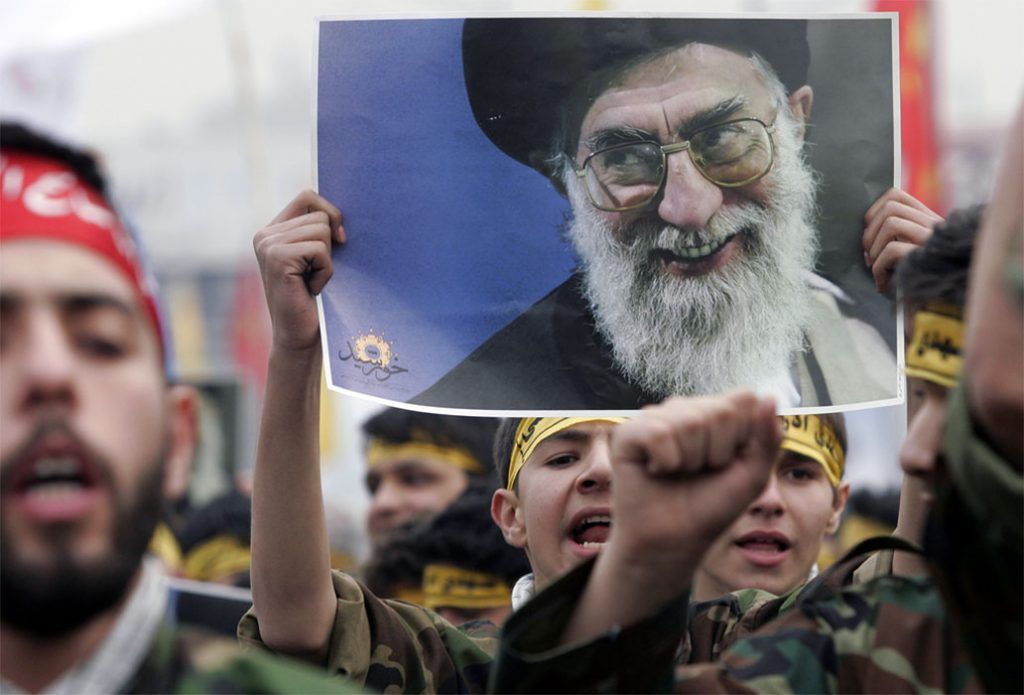How does religion really influence Iranian nuclear policy?
By Ariane Tabatabai | November 18, 2014
 Supreme Leader of Iran Ali Khamenei
Supreme Leader of Iran Ali Khamenei
One of the most enduring myths about post-revolutionary Iran is that the country’s policies, including those on nuclear matters, are shaped by its leadership’s obsession with martyrdom and Messianic ideals. Many observers, especially in the arms control community, base their analyses on this notion, and it leads to some harrowing conclusions. If, after all, a country’s stance is basically suicidal, there’s no telling what it would do with a nuclear weapon. A careful and more nuanced look at the role of religion in Iranian decision-making, though, debunks the idea that martyrdom rules in Tehran, and gives a much more realistic basis for understanding the regime’s behavior.
To be sure, there are reasons why some analysts see the Iranian government as driven by martyrdom. The idea originated with the 1980-1988 Iran-Iraq War, which helped shape the Iranian psyche and the image of the Islamic Republic in the world. During the war, Iran famously launched a series of “human wave attacks,” sending untrained and unprepared men (and occasionally boys) to the front, sometimes through minefields, to clear the way for the trained forces. This tactic went hand-in-hand with the notion of martyrdom, with members of this ill-equipped vanguard promised a place in paradise if they gave their lives for God and country. Mental images of young boys wearing plastic “keys to paradise” around their necks and running across minefields have haunted the war’s observers, and though whether such keys actually existed remains controversial, the picture lingers and contributes to perceptions of Iran.
Much later, former President Mahmoud Ahmadinejad probably encouraged the notion of martyrdom’s importance in politics with rhetoric deemed bizarre. For instance, in 2005 he said that some delegates at the United Nations General Assembly had seen a “halo” around his head. During his 2005-2013 presidency, Iranians joked that Ahmadinejad would always put out an extra plate at his table for the “Mahdi.”
Shia Muslims believe that the Mahdi, born in the ninth century and also known as the Hidden Imam or the Twelfth Imam, is the Prophet Mohammed’s last legitimate successor. They believe that he has gone into occultation—the state of being blocked from view—but will eventually return, much as Christians believe that Jesus Christ will return some day. According to Shia belief, the Hidden Imam will reappear along with Christ and together they will restore peace and justice, saving the world from the chaos into which it would otherwise descend.
The notions of martyrdom and “Mahdism” have led many to extrapolate that the Iranian leadership’s actions are governed by an inherent suicidal tendency and a willingness to cause chaos, even if it’s self-destructive, in order to facilitate the Mahdi’s return. But if one goes beyond the revolutionary rhetoric and examines the Islamic Republic’s actions, one realizes that more often than not, Tehran is driven by national or regime interests, rather than pure ideology and belief. In fact, Iran’s rulers often use ideology as a means, and do not see it as an end. It’s true that the regime sometimes makes decisions that seem irrational to outside observers. But this is not generally due to religious belief but rather to the fact that the regime’s interests and the national interest do not align—for example, Iran and Israel have many common strategic interests, yet Tehran has adopted anti-Israeli rhetoric and policies since the 1979 revolution. This stance may not serve national interests, but it certainly advances the Islamic Republic’s interest in a strong, external-enemy narrative.
The phantom fatwa. None of this is to say that Islam does not play any role in security decision-making in Iran. Most followers of the country’s nuclear affairs are aware of the famous fatwa reportedly issued by Iran’s Supreme Leader Ayatollah Khamenei prohibiting nuclear weapons. But this fatwa, or religious edict, has become a puzzle.
In order to issue a fatwa, a religious figure must be deemed an authority in Islamic jurisprudence. (This is why to most Islamic scholars, fatwas issued by Al Qaeda leadership in support of the use of nuclear weapons are void of any legitimacy.) But a fatwa does not have to be written. It can be spoken if it meets certain requirements, such as having been witnessed. In this particular case, Khamenei does not appear to have written the fatwa, but it has been communicated to the International Atomic Energy Agency (IAEA) and repeated a number of times by Khamenei himself, as well as by other government officials. It is unclear whether the fatwa covers only the “use” of these weapons, or their “production and stockpiling” too, as Khamenei has been quoted saying both.
Some scholars and policy makers believe the Khamenei nuclear-weapons fatwa to be bogus because it is not written, and therefore irrelevant. Others believe it to be all-important. Neither side has seen a fatwa, and it has not been published on Khamenei’s otherwise extremely comprehensive website.
Adding further ambiguity to the fatwa’s status is the fact that such rulings can be overturned, allowing the faith to change and adapt to the times. The founder of the Islamic Republic, the Ayatollah Khomeini, famously overturned a number of fatwas. Even this possibility of reversal, though, does not necessarily make pursuit of an Iranian Bomb more likely, because while there is no religious constraint on canceling a fatwa, the geopolitical cost of overriding this one would be high. Iran has promoted the fatwa in various forums for more than a decade and it is finally being recognized and referred to by world leaders. In a way, by leading a public relations campaign promoting the edict, Tehran has constrained its ability to overturn it.
Nuclear weapons in Shia jurisprudence. Virtually absent from the debate is the fact that Shia scholars who have spoken on nuclear weapons show consensus. Few Grand Ayatollahs have discussed the issue, but those who have present arguments similar to Khamenei’s, regardless of personal political stance. Hence, whether they support the Islamic Republic or oppose it, and whether or not they believe that politics and religion should be intertwined (many Iranian Shia clerics say they should not), they believe weapons of mass destruction to be against the faith. What is unclear, however, is the scope of this prohibition. Clerics tend to be generalists, trained to cover all possible matters from which foot to enter the bathroom with (left!) to the use of technology in warfare. This means that the legal debate is neither elaborate nor nuanced.
But the basic principles underlying the Supreme Leader and the other clerics’ rulings are very close to those in international law. In Shia jurisprudence, like in international humanitarian law, there must be a distinction between combatants and non-combatants. Non-combatants, typically defined as women, children, the elderly, and those mentally unfit to fight, are not to be targeted. Hence, using poison in bodies of water and burning trees is not allowed. The environment too must be protected. These are among the key notions shaping Shia thinking on indiscriminate warfare.
Does it matter what the faith says? A dissident Iranian Shia cleric, Mohsen Kadivar, points out that when Saddam Hussein’s missiles targeted Iranian cities during the Iran-Iraq war, officials asked Khomeini for permission to retaliate in kind. At first he refused, hewing to the Shia ban on indiscriminate warfare. Eventually, though, he allowed similar attacks to be carried out. There are similar examples in which Iran has acted rationally with little or no regard to religious doctrine or sectarianism. Consider Tehran’s relations with two neighbors to its northwest, Azerbaijan and Armenia. Armenia is a Christian country, with good ties to Tehran, while Azerbaijan, a Shia-majority state, has had complicated relations with Iran. In Iranians’ view, Azerbaijan tries to arouse their own Azeri population’s separatism and enables some Israeli actions that target Iran. Tehran’s policies are not driven by sectarianism and ideology here, but rather by national interests.
The role of religion in post-revolutionary Iranian politics is complex and often misunderstood in the West. It seems clear, though, that the regime follows its practical interests. When ideology serves these interests, it is put forward as a rationale; otherwise, it takes a backseat. Observers who continue to argue that the regime wishes to hasten the return of the Mahdi, and that Iran will therefore withdraw from the Nuclear Non-Proliferation Treaty and develop nuclear weapons, are contradicted by the facts. In actuality, Tehran highlights that it is party to a number of international treaties, and that its program has been in strict compliance with its international obligations. Whether or not this is the case is a different story, but a suicidal regime wouldn’t bother preserving appearances. The regime has not reversed the fatwa or withdrawn from the NPT—precisely because those would be suicidal moves. It is to the government’s advantage to be seen as unlikely to pursue a nuclear weapon, so it cites Khamenei’s fatwa. But the regime puts forward no religious rationale for the fact that 35 years after the US embassy hostage crisis, with the backing of the Supreme Leader, it is negotiating with what the revolutionaries then called the “Great Satan.” It would not be doing so if it did not believe it was acting in its own real-world interest.
Together, we make the world safer.
The Bulletin elevates expert voices above the noise. But as an independent nonprofit organization, our operations depend on the support of readers like you. Help us continue to deliver quality journalism that holds leaders accountable. Your support of our work at any level is important. In return, we promise our coverage will be understandable, influential, vigilant, solution-oriented, and fair-minded. Together we can make a difference.














